EU Is Getting Better at Doing Nothing on the Migrant Crisis
Adelina Marini, October 22, 2015
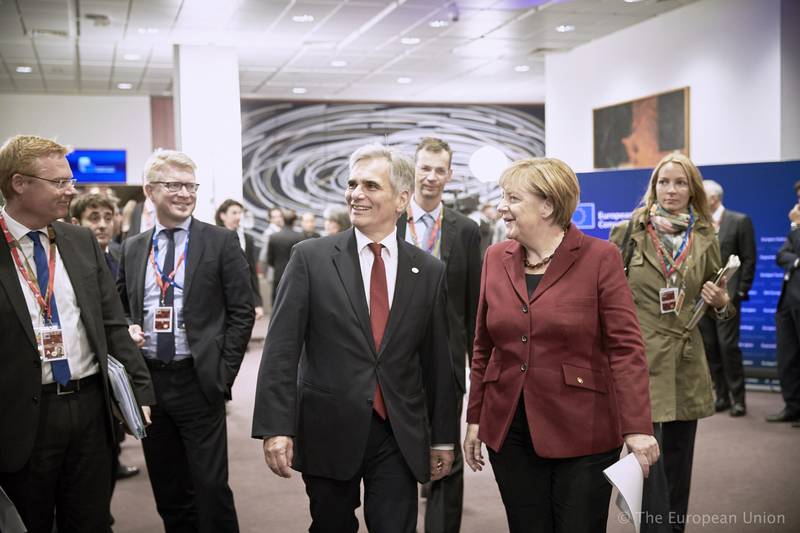 The October summit, fourth in a row dedicated to the migrant-refugee crisis, could as well not have happened at all. The only thing it could have been remembered for is that the Bulgarian Prime Minister left it shortly before its ending because of an accident at the Bulgarian-Turkish border that caused the death of an Afghan migrant. It could also be remembered for showing that the European Union is getting even better at chasing its own tail. After the “historic” decisions from September and the “historic” appearance in front of the European Parliament of the European engine – France and Germany – the regular European Council of October 15 showed that the EU is totally incapable of continuing forward on any subject that is key to the Union. The agenda was loaded with expectations for a new step forward regarding common border protection, a reform of the Dublin regulation, Schengen, and other very important and pressing issues.
The October summit, fourth in a row dedicated to the migrant-refugee crisis, could as well not have happened at all. The only thing it could have been remembered for is that the Bulgarian Prime Minister left it shortly before its ending because of an accident at the Bulgarian-Turkish border that caused the death of an Afghan migrant. It could also be remembered for showing that the European Union is getting even better at chasing its own tail. After the “historic” decisions from September and the “historic” appearance in front of the European Parliament of the European engine – France and Germany – the regular European Council of October 15 showed that the EU is totally incapable of continuing forward on any subject that is key to the Union. The agenda was loaded with expectations for a new step forward regarding common border protection, a reform of the Dublin regulation, Schengen, and other very important and pressing issues.
Instead of conclusions, however, meaning decisions with legislative value, the summit ended with the less known form of “orientations”. Usually, when a given summit does not come up with certain decisions (conclusions), the leaders come up with a declaration. Orientations are definitely a novel form, which is weaker than a declaration, or a statement. It looks more like a to-do-list. They are a euphemism for delaying conclusions for better times. The text of the “orientations” is in the spirit of the developed to a point of excellence battle for every word and comma, which often leads to self-excluding sentences, aiming to soothe someone’s momentary pain. Finding itself completely impotent in solving the problems on its own territory with the available legislation, the EU attempted to export its problem to Turkey, but it drew a blank there as well and so postponed any concrete decisions. Even the future of the euro area is left to simmer for a while, awaiting better times.
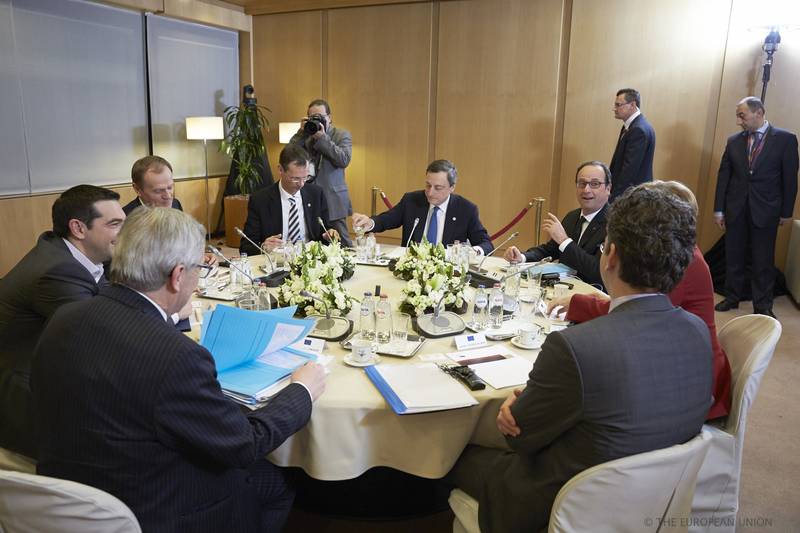 The result of the meeting is a true stalemate. The situation is so stalemate, that the European Council boss, Donald Tusk, started his press conference at midnight on Thursday with the words: “First of all, allow me to express cautious optimism, and I have to underline, of course, the word cautious.” The summit not only failed to change anything for the better, but worsened the situation. On the very next day Hungary sealed entirely its border with Croatia and started to allow crossing only at the official border crossings. Prime Minister Victor Orbán explained that starting from October 17th Hungary began to enforce Schengen rules. This led to a secondary raise in tension along the Belgrade-Zagreb-Ljubljana axis, because of which EC boss Jean-Claude Juncker is calling a (long overdue) meeting on Sunday (October 25) of the leaders of countries along the Balkan refugee route – Bulgaria, Croatia, Greece, Romania, Hungary, Serbia, Macedonia, and Slovenia, as well as refugee dream-countries – Austria and Germany.
The result of the meeting is a true stalemate. The situation is so stalemate, that the European Council boss, Donald Tusk, started his press conference at midnight on Thursday with the words: “First of all, allow me to express cautious optimism, and I have to underline, of course, the word cautious.” The summit not only failed to change anything for the better, but worsened the situation. On the very next day Hungary sealed entirely its border with Croatia and started to allow crossing only at the official border crossings. Prime Minister Victor Orbán explained that starting from October 17th Hungary began to enforce Schengen rules. This led to a secondary raise in tension along the Belgrade-Zagreb-Ljubljana axis, because of which EC boss Jean-Claude Juncker is calling a (long overdue) meeting on Sunday (October 25) of the leaders of countries along the Balkan refugee route – Bulgaria, Croatia, Greece, Romania, Hungary, Serbia, Macedonia, and Slovenia, as well as refugee dream-countries – Austria and Germany.
The EU proposes bitter sweeteners to Turkey
In the so called orientations, the leaders of the 28 hail the action plan for Turkey that the EC presented in the beginning of the month, which in itself is an attempt to set in motion the immovable. In the plan, the EU commits to adequately match the funds that Turkey is spending on the over 2.5 million refugees that are in its territory (mainly Syrian). Turkey claims having spent over 7 billion US Dollars on them so far. At the day of the summit, The Financial Times published an unofficial document, according to which the EU is committing to three billion euro. All leaders and members of national delegations, however, avoided this figure like devils do incense. Nobody wanted to commit to a certain number. Mr Juncker said he was aware of an ongoing “debate in the press” on the amount the EU is prepared to disburse, but “this will be part of the discussions we'll have in the coming days”, he said, referring to the negotiations that his right hand Frans Timmermans (Netherlands, Socialists and Democrats) led in Ankara.
German Chancellor Angela Merkel admitted that the subject of the three billion was discussed during the meeting, but expressed just her personal position that the EU needs to be more active in sharing Turkey’s burden. “If we say Turkey has indeed spent over the past few years these 7 bn, in return, that would mean the EU also shoulders a comparable sum.” She added, however, that the EU cannot do this from the European budget alone. What individual member states could do on the issue has been discussed and it was mentioned that financial aid was needed to keep refugees closer to their respective motherlands.
French President François Hollande spilled the beans in saying that it is not just about giving money, but also what the effect of this money will be and how will it influence the improvement of life for refugees in Turkey. According to the action plan for Turkey, these monies should be disbursed through the European trust fund for Syria. Before the start of the meeting, the EC published a report on the fulfilment of commitments that these same leaders made on September 23rd. It turns out that many of them have yet to fulfil their commitments. After the October 15th summit, Mr Juncker announced that member-states have promised to meet their obligations and in the following weeks money transfers can be expected. The EC insists that Turkey uses the money to provide refugees with access to its labour market, public services like healthcare and education, and provide adequate infrastructure.
In their “orientations”, the 28 Prime Ministers and Presidents agree that if Turkey implements successfully the action plan that would lead to a speeding-up in the process of visa-liberalisation with Turkey and to the full implementation of the readmission agreement, going in full effect on October 1st 2017. They also urge for the negotiation process with Turkey to be “re-energised”, “in accordance with the negotiating framework and the relevant Council conclusions”. This is one of these self-excluding sentences. Negotiations with Turkey are blocked mainly by Cyprus, due to non-implementing of the agreement for the customs union, as well as other unsolved issues, stemming from Cyprus’ status. A block has been placed by France as well, whose resistance continues, as became clear from President François Hollande’s press conference on Thursday night. In his words “The accession process with Turkey can resume but this decision had been made before and in any case it must be done based on the criteria and the conditions initially set”.
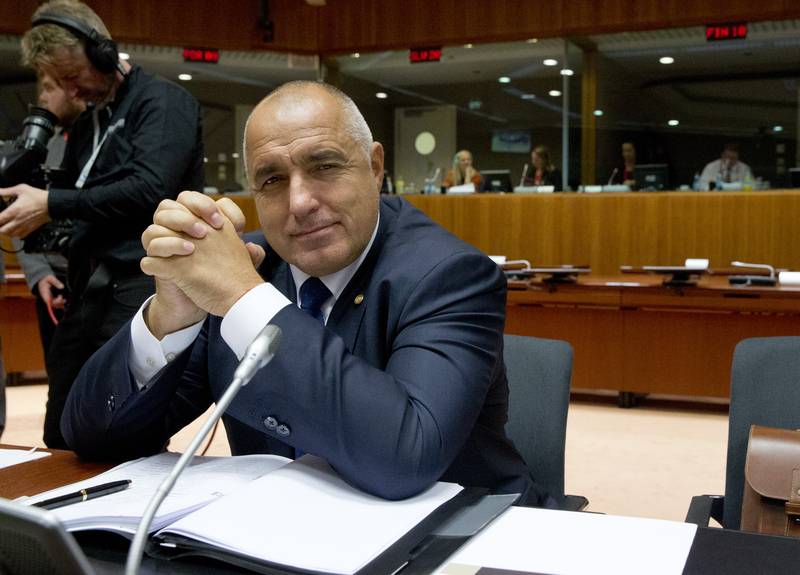 Some chapters could be considered (for opening) “but this fits a process which is far from being over and it is only in the end Turkey's accession can be raised”, said the French president. There was talk in the lobbies of Brussels of a possible opening of Chapter 17 “Economic and monetary affairs". Real negotiations, however, according to the new European methodology, begin only when the most important negotiation chapters are open – 23 and 24. Those are the chapters covering justice, human rights and minority rights, and freedom of media. Those are the spheres in which Turkey has been repeatedly failing over the last ten years. Regarding visa liberalisation, President Hollande was adamant that it could happen only under very strict conditions and continuous monitoring. He said that he insisted on this in front of his colleagues “because there should be no misunderstanding”. He added that liberalisation is a two-way process. There needs to be control exercised by Turkey.
Some chapters could be considered (for opening) “but this fits a process which is far from being over and it is only in the end Turkey's accession can be raised”, said the French president. There was talk in the lobbies of Brussels of a possible opening of Chapter 17 “Economic and monetary affairs". Real negotiations, however, according to the new European methodology, begin only when the most important negotiation chapters are open – 23 and 24. Those are the chapters covering justice, human rights and minority rights, and freedom of media. Those are the spheres in which Turkey has been repeatedly failing over the last ten years. Regarding visa liberalisation, President Hollande was adamant that it could happen only under very strict conditions and continuous monitoring. He said that he insisted on this in front of his colleagues “because there should be no misunderstanding”. He added that liberalisation is a two-way process. There needs to be control exercised by Turkey.
What is expected of Turkey, according to the action plan, is better protection of its coastal border, better cooperation with Bulgarian and Greek authorities in the prevention of illegal migration through their common land borders, speeding-up of the procedures of readmission of illegal migrants, following the procedures for granting asylum, fight against human traffickers, enhancing its cooperation with Frontex, especially in the line of information exchange and sending a liaison officer to Europol. Turkey is also to institute a visa regime and sign the necessary agreements with the states, which are the main source of illegal migration through Turkey into the EU.
The EU‘s attempt to bribe Turkey into keeping refugees at its own territory, without selling it its over-glorified values in exchange, has so far been unsuccessful. The flow continues, and the only winner turns out to be President Recep Tayyip Erdoğan, who is preparing for elections in November. By all accounts he is not going to receive the regular slap in the face from Brussels in the form of the annual report on the progress towards European membership. Usually the EC publishes its reports on the enlargement process in the beginning of October. Last year they were presented on October 8th. The document on Turkey was especially criticising, although there was a certain allowance made to the country for sheltering refugees and for its balancing role in the region. The most criticism, as usual, is on interference with the work of the judicial system, thwarting of media freedom, suppression of democratic protests, disrespect to the rights of minorities, women and children.
In the spirit of the political face of the European Commission under the leadership of veteran Jean-Claude Juncker, the date for publishing the report on Turkey (obviously all other reports as well) has been placed in a weird dependence – on media attention. Every day journalists in Brussels are asking when we can expect the report and are receiving a peculiar reply – when the media attention is appropriate. One of the EC‘s spokespeople, Mina Andreeva, said quite up-front on Tuesday that the decision on the date will be made by President Juncker. She repeated once more that it will be in accordance with media attention.
Reactions of the majority of political groups in the European Parliament were of disappointment by the October European Council. The leader of the EPP group, Manfred Weber (Germany), stated that the decisions were totally inadequate to dealing with the challenges. "Too many EU Member States still believe that they will be able to bumble through the crisis with a closed-eyes strategy. But this is an illusion“, he said in a statement. As usual, the leader of the Liberals group, Guy Verhofstadt (Belgium), was highly critical: “Europe is trying to outsource this refugee crisis, without taking its responsibility to protect those in need. It is positive that the EU will work more closely together with Turkey, but we should not make ourselves dependent on a country which is becoming increasingly authoritarian”, warned the former Belgian PM.
The Greens and the European Free Alliance also reacted sharply. According to the co-chairs of the group, Rebecca Harms (Germany) and Philippe Lamberts (Belgium), "This summit has again revealed the difficulty for EU governments to find a common response to the refugee crisis. The most important issue, namely how to permanently share the responsibility for distributing refugees, has again been postponed." They are both worried by the lack of criticism towards Turkey. "This lack of criticism, combined with the promises to Erdogan in this agreement, risk creating the impression that the EU supports the irresponsible politics of the Erdogan government just two weeks before the elections", they say.
Leader of the group of Socialists and Democrats Gianni Pittella (Italy) is also worried by the allowances to Turkey. "Human rights, press freedom and minority rights must be guaranteed and empowered throughout the whole of Turkey. I want to make this very clear to Donald Tusk, especially now as decisive elections are imminent in Turkey", he said before his meeting with the president of the European Council. The leader of the group of the far left, Gabriele Zimmer (Germany), made no exception. "We cannot accept a dirty deal with Turkey. Through our negotiations and our actions we must protect the rights of refugees and call for an immediate end to Erdoğan's war on the Kurdish people," she concluded.
Start was given to … talking about a common border guard
The most important issue, which was left with no solution, is common border guard. Leaders discussed for the first time the idea on which the Commission is expected to present an official proposal at the end of the year. In the leaders orientations, there is stated intention to work towards "the gradual establishment of an integrated management system for external borders". It does say, however, that this is to happen within the existing mandate of Frontex. European Council President Donald Tusk expected the leaders to agree on broadening the Frontex mandate in this respect as well. At the end of the meeting he said that on this item there was a "very important achievement" made. Later on, however, he stated that the future of the Dublin system and the European border system, as well as the hotspots, remained debatable issues. "If we are not able to find humanitarian and efficient solutions, then others will find solutions which are inhumane, nationalistic and for sure not European", said the former Polish Prime Minister.
French President François Hollande stated that a solution to the problems cannot be found until an adequate protection of the borders is present. According to Angela Merkel, too much energy was lost in negotiating the temporary mechanism for refugee distribution and now efforts must be directed towards its implementation. The accident at the Bulgarian-Turkish border, which to this point remains unclear, for the official version of Bulgarian authorities and the statements of the detained migrants given to the Bulgarian Helsinki Committee are totally opposite, caused Donald Tusk to state that this incident shows how important it is to work on guarding the external borders.
Unlike the EU Visegrád works in unity
The summit once more unveiled the growing disunity between the EU and the Visegrád group. In a bout of midnight frankness the German chancellor stated that she does not understand the reasons behind Eastern-Europeans having such firm positions on refugees. "For reasons that I don‘t yet completely understand Eastern European member states seem to feel that they have not been properly treated, not properly acknowledged and since I've known them as honest partners in the negotiations I have to look closer as to why they react so harshly", she said. A little before the start of the strongly compressed October summit there was a meeting in Brussels of the leaders of the countries from the Visegrád Four – Poland, Hungary, Czech Republic, and Slovakia. They came out with a joint declaration, most of which had many similarities with the draft conclusions for the European Council.
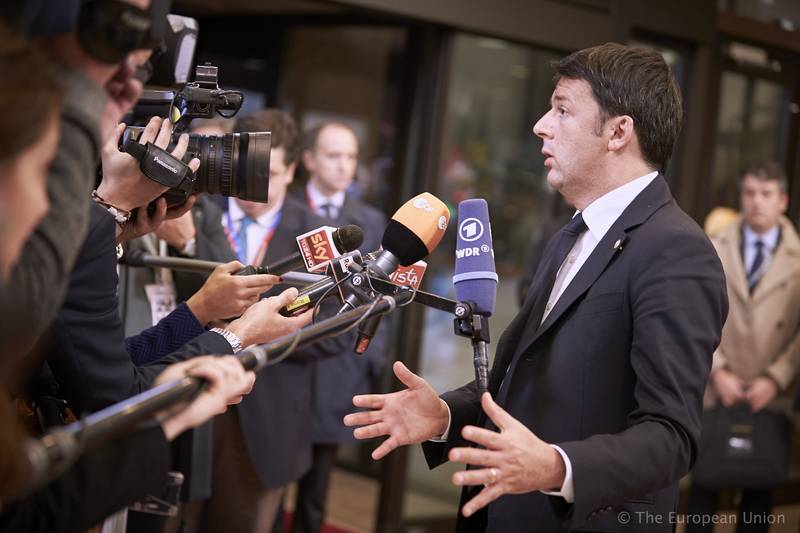 According to the four Prime Ministers, the protection of Schengen borders must be a main priority. They state their readiness to aid each other in implementing this priority. The four states also committed to contributing 1.8 million euro in the account of the World Food Programme. They state their preparedness to contribute money into other funds, but do not commit to an exact amount; neither do they say when they are going to do it. Upon exiting the European Council, Hungarian PM Viktor Orbán said that the good news was that “there are four countries in the EU which are able to rush to one another’s help almost unconditionally in a very serious and difficult issue, the issue of border policing”.
According to the four Prime Ministers, the protection of Schengen borders must be a main priority. They state their readiness to aid each other in implementing this priority. The four states also committed to contributing 1.8 million euro in the account of the World Food Programme. They state their preparedness to contribute money into other funds, but do not commit to an exact amount; neither do they say when they are going to do it. Upon exiting the European Council, Hungarian PM Viktor Orbán said that the good news was that “there are four countries in the EU which are able to rush to one another’s help almost unconditionally in a very serious and difficult issue, the issue of border policing”.
In his words, half the meeting was unsuccessful, for there is no solution yet to the problem at the Greek-Turkish border. He reminded that his proposal to close this border was not accepted, while this would have helped Macedonia, Serbia, Croatia, and Hungary. “There is still not sufficient strength, determination and political will to take over the responsibility of border protection, fully or partially, from Greece which is unable to protect its own borders”, he said. Mr Orbán stated that because of their dream of a borderless European continent member states have lost their professional expertise on border policing. Now this capacity has to be recreated. Angela Merkel stated her indirect support for the formation of an inner circle of the EU (Schengen). “We now have a sort of an inner ring, inner border if you like, because the external borders have not yet been reinforced and protected. I'm not against this but I asked the member states who felt committed to this internal ring as it were not to completely be against this protection of the external border and they said they're not totally against it".
Bulgaria, however is sharply against the creation of such an inner circle, as is Croatia, which currently is once more in the epicentre of the refugee crisis. The two, however, differ significantly in respect of aims. While Bulgaria thinks that in order to avoid the creation of such inner circle the country must immediately enter Schengen, the Croatian government feels that it does not want to enter “such Schengen“. Deputy PM Meglena Kuneva was outraged that the EU is prepared to make concessions to Turkey and not to Bulgaria. Croatian First Deputy PM and Minister of External Affairs Vesna Pusić backed Prime Minister Zoran Milanović, who recently reacted sharply against Schengen in stating that if this is what Schengen is then Croatia better not hurry with its membership. According to Vesna Pusić, if she had been asked before the crisis, Schengen membership was number one priority, she said in an interview for a Croatian television station, implying that this is no longer a priority.
Italian Prime Minister Matteo Renzi, with a fitting ironic smile, stated at the end of the summit that "in this building many colleagues theorise regarding following European rules, only they forget to do it". This is a perfect summary to one of the most inglorious and faceless EU summits.
Translated by Stanimir Stoev
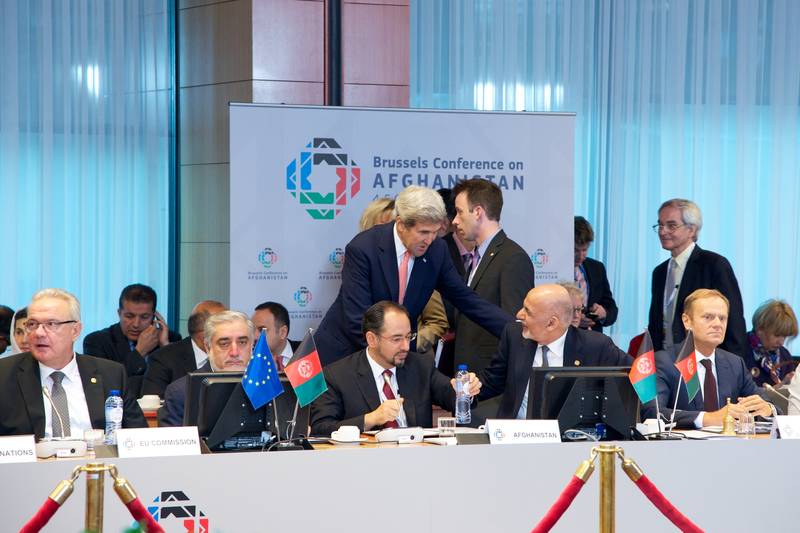 | © Council of the EU
| © Council of the EU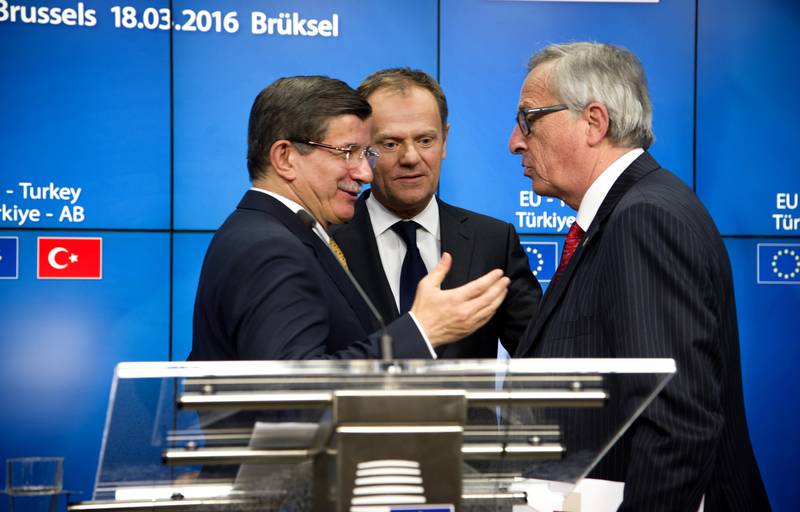 Davutoglu, Tusk, Juncker | © Council of the EU
Davutoglu, Tusk, Juncker | © Council of the EU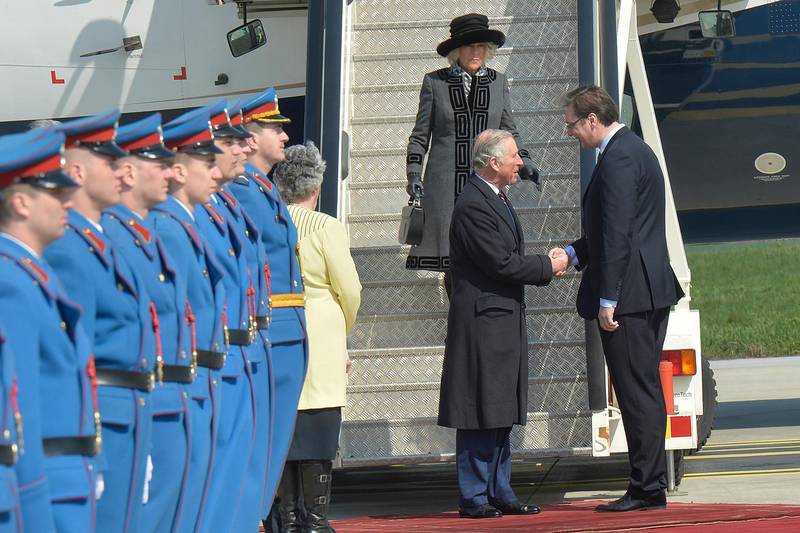 | © Vlada RS
| © Vlada RS